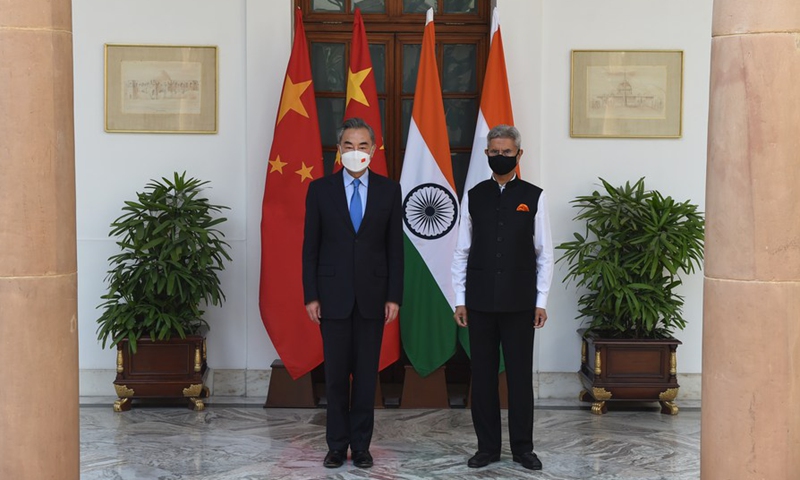
Visiting Chinese State Councilor and Foreign Minister Wang Yi (L) talks with Indian External Affairs Minister Subrahmanyam Jaishankar in New Delhi, India, March 25, 2022.Photo:Xinhua
New Delhi is set to be busy these days as US deputy national security advisor Daleep Singh, Washington's key architect for sanctions on Russia, landed on Thursday with the expectation to pressure India to loosen ties with Russia, whose foreign minister Sergey Lavrov is scheduled to visit India the following day.
The almost simultaneous arrivals of Singh and Lavrov are "coincidence," according to New Delhi, but it has demonstrated how India's insistence on strategic autonomy in the Russia-Ukraine conflict has given the country a current status where both the US and Russia consult with it actively, allowing India to maximize its interests in this contentious issue of international attention, observers said.
The "comfortable" situation would encourage India to maintain its strategic autonomy and reconsider how much it should join the US on Indo-Pacific affairs, as the costs of being a closer US partner could exert greater pressure on India over issues on which New Delhi does not want to take sides, they said.
The White House said Tuesday that Singh's visit was to discuss the "consequences" of Russia's "unjustified war" against Ukraine and the development of an Indo-Pacific economic framework. The preparations for the upcoming "2+2" foreign and defense ministerial dialogue in Washington, likely in mid-April, are also on Singh's agenda.
Multiple Indian media outlets pointed out Singh's planned trip to India comes in the midst of a flurry of "high-profile visits to the country" including those by British Foreign Secretary Liz Truss and German Foreign and Security Policy Advisor Jens Plotner.
The Hindustan Times reported that Lavrov will arrive on Friday after a two-day visit to China, with overcoming the fallout of US sanctions on Russia's defense and economic deals with India uppermost on his agenda.
Such a flurry of visits by senior officials of leading countries in the world are uncommon.
Unlike many Western powers, India has not yet criticized Russia over the Ukraine issue. It also abstained on a resolution pushed by Russia, which was "seen as reflective of its neutral position on the conflict," the Indian Express reported.
Zhao Gancheng, a research fellow at the Shanghai Institute for International Studies, told the Global Times that India has won itself greater room to maneuver between countries of different stances with its "neutral position" on the issue.
Lavrov may discuss rupee-ruble denominated payments using Russia's SPFS system since Russia was banned from the SWIFT system commonly used in international transactions, Bloomberg said.
Since March, five cargo shipments of discounted Russian oil, or about 6 million barrels, have been loaded with India as destination, CNBC reported. The amount is half of India's oil imports from Russia the previous year.
India has also been firm on its stance on arms purchases from Russia, for which the US has proposed arms sales to India as a replacement.
Zhao said India's resistance to Western pressure surprised and frustrated Washington which wanted a universal voice against Moscow among its allies and partners.
US President Joe Biden said last week the world had mounted a "united front" across Europe and the Pacific with the "possible exception of India."
Lan Jianxue, head of the Department for Asia-Pacific Studies at the China Institute of International Studies, predicted mounting pressure from the US and its allies on India to sway its stance.
A significant increase in Russian oil imports by India could expose New Delhi to a "great risk" as the US prepares to step up enforcement of sanctions against Moscow, Reuters cited a senior US government official as saying.
India's tactical maneuvers in the past between leading powers make the US believe that India can be courted with enough interests, which is why the US tried very hard to persuade India, including engaging other QUAD members to lobby it, Lan said.
The Russia-Ukraine conflict actually gave India a chance to reconsider and probably adjust its relations with the US, because "bundling with the US too tightly has significantly increased costs for India to maintain its strategic autonomy," the expert said.




